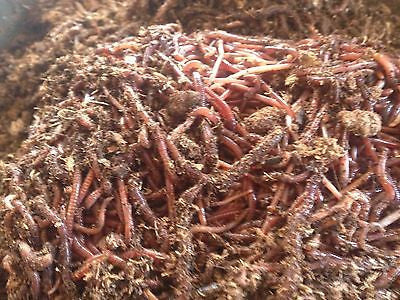Red Wiggler Worms - Reliable Decomposers for Your Garden Compost Container
Red Wiggler Worms Demystified: Unlocking the Keys of Vermiculture for Greener Living and Nutrient-Rich Dirt
In the world of sustainable methods for improving soil high quality and advertising eco-conscious living, red wiggler worms play a pivotal yet commonly neglected function. These simple animals have the amazing capability to transform organic waste right into nutrient-rich spreadings that work as a potent natural plant food. By delving right into the world of vermiculture, one can discover a myriad of benefits that prolong much beyond typical composting techniques. Understanding the intricacies of caring for these worms, maximizing their environment, and harnessing their spreadings can lead to a greener way of living and healthier soil for plants to grow.
The Duty of Red Wiggler Worms
Red Wiggler worms play an essential function in composting systems by efficiently damaging down raw material right into nutrient-rich spreadings. These starved eaters consume a variety of natural materials, such as kitchen scraps, backyard waste, and paper items. As they feed, the worms' digestion processes break down the raw material into a penalty, dark, and nutrient-dense product called worm spreadings or vermicompost.
The castings generated by Red Wiggler worms are extremely advantageous for dirt health and wellness and plant growth. They are abundant in important nutrients like potassium, phosphorus, and nitrogen, which are crucial for supporting healthy and balanced plant development. Furthermore, worm spreadings include valuable microorganisms and enzymes that aid improve dirt structure, rise water retention, and improve nutrient uptake by plants.
Benefits of Vermicomposting

It enhances dirt structure, boosts soil oygenation, and boosts soil wetness retention. Vermicompost also enhances the dirt with essential nutrients like nitrogen, potassium, and phosphorus, advertising plant development and overall soil fertility.
Furthermore, vermicomposting assistances lasting gardening methods by giving a natural and chemical-free choice to artificial fertilizers. Red Wiggler Worms. This ecologically pleasant strategy not just enriches the soil however additionally helps minimize dependence on harmful chemicals, promoting a greener and a lot more lasting means of gardening
Establishing a Worm Bin
When developing a worm container for vermicomposting, appropriate setup is essential to guarantee the success of the composting process. The initial step in setting up a worm container is choosing an appropriate container.
After adding the bedding, present the red wiggler worms to the bin. The worms should then be given with food scraps such as fruit and vegetable peels, coffee premises, and eggshells.
Routinely monitor the wetness levels and temperature in the worm container to guarantee optimum conditions for site the worms. With correct setup and upkeep, the worm container will efficiently transform organic waste into nutrient-rich garden compost for your plants and garden.
Gathering Worm Spreadings
To effectively gather nutrient-rich worm spreadings from your vermicomposting system, an organized harvesting approach is important. When it comes time to gather the worm castings, there are click this a few essential steps to follow to guarantee a successful process.

Troubleshooting Common Issues
Recognizing and addressing common challenges that may arise during the vermicomposting process is important for preserving a healthy and balanced and effective worm container. Including excess food scraps can lead to an accumulation of wetness and acidity in the worm bin, potentially harming the worms. Another issue is unpleasant smells rising from the worm container.
Furthermore, if the worm populace is declining or the worms appear unhealthy, maybe as a result of ecological stressors such as extreme temperatures or pH degrees. Monitoring these variables and making essential changes is necessary for the wellness of the worms. By fixing these typical problems quickly, vermicomposters can guarantee a smooth and successful vermicomposting process while maintaining a flourishing worm population.

Conclusion
Finally, red wiggler worms play an important duty in vermiculture by damaging down organic matter right into nutrient-rich dirt. The benefits of vermiculture include greener living and boosted soil high quality. Establishing up a worm bin is necessary for pop over to this site effective vermiculture, and collecting worm castings offers useful garden compost for horticulture. By comprehending and repairing usual concerns, people can open the tricks of vermiculture for lasting living and much healthier soil.
As they feed, the worms' digestive system procedures break down the organic matter right into a penalty, dark, and nutrient-dense material understood as worm castings or vermicompost.
The spreadings generated by Red Wiggler worms are extremely helpful for soil health and plant development. Including excess food scraps can lead to an accumulation of moisture and level of acidity in the worm container, potentially damaging the worms.In addition, if the worm population is declining or the worms show up undesirable, it might be due to ecological stress factors such as severe temperatures or pH degrees. Establishing up a worm bin is vital for successful vermiculture, and collecting worm castings provides valuable garden compost for gardening.